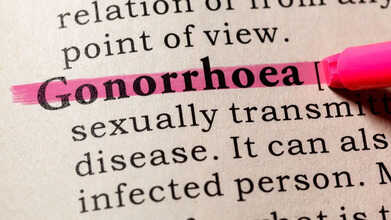- Health Conditions A-Z
- Health & Wellness
- Nutrition
- Fitness
- Health News
- Ayurveda
- Videos
- Medicine A-Z
- Parenting
Can Apple Cider Vinegar Treat Dandruff?

Credit: Canva
Apple cider vinegar (ACV) is a type of vinegar made from crushed, fermented apples, yeast, and sugar. It is a popular ingredient in foods such as salad dressings, pickles, and marinades. In recent years, it has gained popularity for its potential benefits in weight loss and blood pressure regulation. ACV is generally safe when used correctly and contains some of the same nutrients as apple juice, including B vitamins and polyphenol antioxidants, however, overuse can prove to be detrimental to your health.
Is It Good For Your Hair?
To begin with, there is no scientific evidence that proves ACV is beneficial for your hair. However, anecdotal evidence suggests that it may help treat dandruff and provide some benefits for scalp health. A 2022 review further provides evidence for the same, underscoring that ACV may be effective in reducing scalp dryness. Since a dry scalp can sometimes resemble dandruff, this might contribute to its perceived benefits.
Meanwhile, bloggers have claimed that an ACV rinse might help people with curly hair achieve a bounce in their hair. The reason behind this is that the vinegar does not weigh down individual strands of hair as conventional shampoos and conditioners might.
ACV, in general, supports skin health, as it has antifungal and disinfectant properties. A 2019 test-tube study found that while undiluted ACV has strong antimicrobial properties, it may not be effective against all types of microorganisms. While ACV performed well against bacteria at a 25% concentration, it was less effective against Candida yeast.
How To Use ACV For Hair
1. Dilute ACV by mixing two parts vinegar with one part water.2. Apply the mixture to your scalp and leave it on for 15 minutes.
3. Pour the diluted ACV through your hair.
4. Rinse thoroughly with warm water.
5. Repeat twice a week, ensuring it does not come into contact with your eyes.
Can Apple Cider Vinegar Dry Out Your Hair?
There is a high chance that using ACV on hair may cause dryness, particularly if left in without rinsing or used in excessive amounts. The risk is higher without the use of pH-balanced, water-based hair care products.
To minimize potential issues, follow these precautions:
- Start with a small amount before increasing the quantity.
- Patch-test on a small section of hair before applying it all over your scalp.
- Rinse ACV thoroughly to prevent residue buildup. If irritation occurs, wash your hair with a mild shampoo, rinse with warm water, and apply conditioner as usual.
This Common Cold Like Symptom Might Actually Be An Early Sign Of Dementia

Credits: Canva
An early sign of dementia can sometimes look like a common winter-related issue. When this symptom appears along with other warning signals, it may be wise to speak to a doctor. Dementia is a syndrome marked by a collection of related symptoms that point to a gradual decline in brain function. Over time, this can affect memory, behaviour, thinking, and even movement. In its early phase, however, dementia often shows up through subtle changes that are easy to overlook or mistake for something less serious.
This Common Cold Like Symptom Might Actually Be An Early Sign of Dementia
Dementia UK notes that one possible early indicator of dementia is “low mood, anxiety or depression”. Its specialists explain: “In the early stages of dementia, people often begin to notice symptoms that interfere with day-to-day life.” The difficulty is that low mood or depression can also be linked to seasonal affective disorder (SAD), a form of depression that tends to appear during winter and ease as the days become longer and brighter.
Symptoms of Seasonal Affective Disorder (SAD)
The NHS lists the following possible symptoms of SAD:
- Low mood
- Loss of interest in activities you usually enjoy
- Feelings of guilt, hopelessness or worthlessness
- Feeling restless, tense or easily irritated
- Problems with concentration
- Increased appetite and eating more than usual
- Feeling very tired and sleeping more than usual
- Thoughts of suicide or self-harm
Dementia Early Symptoms
Dementia UK also highlights other possible early signs of dementia, including:- Problems with memory and concentration
- Difficulties with language and communication, such as struggling to find words or follow conversations
- Difficulties with planning, problem-solving and making decisions
- Getting lost in familiar places because of problems with orientation and reduced ability to recognise usual cues, such as signs or landmarks
- Changes in behaviour and personality, such as becoming more withdrawn or less patient
How Early Symptoms May Differ Between Dementia Types
The organisation explains: “A person experiencing early symptoms of dementia may notice these changes themselves, or they may be picked up first by family members, friends or colleagues. Memory problems are not always obvious in the early stages of some types of dementia, such as frontotemporal dementia, where changes in behaviour and personality may appear first.
“People with young onset dementia, where symptoms begin before the age of 65, are also less likely to have memory loss as an early symptom.”
Emotional Changes Linked To Specific Forms Of Dementia
The charity also points out that emotional changes can be linked to two specific types of dementia. In vascular dementia, a person may experience “changes in mood, behaviour and personality”, while Lewy body dementia can cause “mood changes, including anxiety and depression”.
Dementia: Why These Symptoms Can Be Hard To Identify
That said, it is often difficult to know at first whether dementia is the cause of these warning signs. Dementia UK advises: “Many symptoms associated with dementia can also be caused by other physical or mental health conditions, such as thyroid disorders, menopause, vitamin B12 deficiency, depression, anxiety, work-related stress or relationship difficulties.
“This means that experiencing symptoms linked to dementia does not automatically mean someone has the condition. However, if you or someone close to you is showing signs or symptoms of dementia, it is important to visit a GP to understand what might be causing them.”
When To Seek Medical Advice
If you or someone you know is showing symptoms that resemble dementia, seeking advice from your GP is an important first step.
FDA Clears First New Gonorrhea Drug In 30 Years Amid Growing Antibiotic Resistance

Credits: Canva
Gonorrhea poses a far more serious challenge than many realise. Over the years, doctors treating the infection have seen their treatment choices steadily shrink. The bacteria responsible, Neisseria gonorrhoeae, has repeatedly adapted to antibiotics, rendering many once-reliable drugs ineffective. As a result, clinicians have been forced to depend heavily on a single injectable medication, a situation that has raised growing concern.
That dependence is becoming increasingly risky. Data from the US Centers for Disease Control and Prevention show that reported cases of gonorrhea, chlamydia, and syphilis have climbed by nearly 90% since 2004. In 2023 alone, the country recorded more than 2.4 million cases of sexually transmitted infections.
FDA Clears First New Gonorrhea Drug In 30 Years
This month, however, marked a significant shift. The US Food and Drug Administration approved two new oral antibiotics to treat gonorrhea: zoliflodacin and gepotidacin. These approvals represent the first entirely new gonorrhea treatments in more than three decades.
“These approvals mark a significant milestone for treatment options for patients with uncomplicated urogenital gonorrhea,” said Dr Adam Sherwat of the FDA in an official statement.
Why Gonorrhea Has Become Harder to Treat
If left untreated, gonorrhea can lead to serious complications, including pelvic inflammatory disease, infertility, and in rare cases, infections that spread to the joints or bloodstream, as per Cleveland Clinic. Many people experience no symptoms at all, allowing the infection to spread quietly. Despite years of research, there is still no licensed vaccine, leaving antibiotics as the primary line of defence.
What the FDA’s Decision Changes
The newly approved treatments offer a fresh sense of hope. Zoliflodacin, developed by the nonprofit Global Antibiotic Research and Development Partnership in collaboration with Innoviva Specialty Therapeutics, is designed as a single-dose oral medication. Gepotidacin, developed by GSK, is taken in two doses and is also approved for treating certain urinary tract infections.
Both medicines eliminate the need for injections, a shift that could make treatment simpler and more accessible, particularly in settings where access to clinics is limited.
FDA Clears First New Gonorrhea Drug: How the Two New Medicines Work
As per Medscape, clinical trial results for both drugs have been encouraging. Zoliflodacin was tested in a large international study involving more than 900 participants across Europe, Africa, Asia, and the US. The drug successfully cured about 90.9% of patients, a rate comparable to the 96.2% success rate of the current injectable standard. Most reported side effects were mild.
Gepotidacin showed similarly strong results in a separate Phase 3 trial that included around 600 patients from six countries. The cure rate reached 92.6%. Some participants reported digestive issues, but these effects were generally described as mild.
What the Trial Results Show
Importantly, both medications were effective against strains of gonorrhea that no longer respond to older antibiotics. That said, public health experts stress that these drugs are not a permanent solution.
“Bacteria are smart. They can pass resistant mechanisms between each other,” said Dr Manica Balasegaram of the Global Antibiotic Research and Development Partnership, speaking to CNN.
Why Experts Say Caution Is Still Needed
Several uncertainties remain. Neither drug has yet shown strong effectiveness against throat infections, known as pharyngeal gonorrhea, which are more difficult to detect and treat. There is also ongoing debate about how best to use the new medications. Some experts argue they should be reserved as last-line treatments, while others believe earlier use could help slow resistance.
Dr Tereza Kasaeva of the World Health Organization described the approvals as “an important and timely development” amid rising global infection rates and limited treatment options, according to The Guardian.
For now, the new drugs provide much-needed breathing room. Whether that progress holds will depend on careful prescribing and close monitoring of how resistance evolves.
Are You Taking Lansoprazole Regularly? NHS Warns Of Possible Health Risks

Credits: Canva
The NHS has shared important guidance on its website for anyone prescribed lansoprazole, especially those taking it for three months or longer. The health service’s site provides trusted, evidence-based advice on many medications and health conditions, helping patients make informed decisions about their treatment.
What Is Lansoprazole And How Is It Used?
Lansoprazole is a commonly prescribed medicine in the UK, belonging to a group called proton pump inhibitors (PPIs). PPIs make up a large portion of prescriptions dispensed in England. Lansoprazole works by reducing the amount of acid in the stomach and is used to treat and prevent various acid-related conditions, as per NHS.
There are four other PPIs similar to lansoprazole: omeprazole, esomeprazole, pantoprazole, and rabeprazole. These medicines lower stomach acid in the same way and generally have similar effects and side effects. Doctors may prescribe a different PPI if lansoprazole is not working as expected or if side effects occur.
People taking lansoprazole often notice improvements in two to three days, though it may take up to four weeks for full effect, so some symptoms can continue during this period.
How Long Should Lansoprazole Be Taken?
The duration of lansoprazole treatment depends on the condition being treated. It is usually advised to take the lowest effective dose for the shortest period to prevent long-term side effects. Some people take lansoprazole for extended periods, sometimes even years, but it should always be under regular supervision by a doctor because of potential risks.
Lansoprazole: What Is The NHS Warning About?
The NHS notes that taking lansoprazole for more than three months can reduce magnesium levels in the blood. Low magnesium may cause fatigue, confusion, dizziness, muscle twitches, shakiness, and irregular heartbeats. Anyone experiencing these symptoms should consult their doctor.
Magnesium is vital for over 300 functions in the body, including nerve and muscle activity (including the heart), bone health, energy production, blood sugar regulation, and blood pressure control. Low magnesium can lead to muscle cramps, tiredness, irregular heart rhythms, and long-term problems like high blood pressure, type 2 diabetes, and weakened bones. It also affects cellular functions and the body’s electrolyte balance.
Using lansoprazole for more than a year may raise the risk of side effects such as bone fractures, gut infections, and vitamin B12 deficiency. Symptoms of B12 deficiency include extreme fatigue, a sore or red tongue, mouth ulcers, and pins-and-needles sensations. Anyone noticing these signs or taking lansoprazole for extended periods should schedule regular check-ups.
The NHS advises: “If you take lansoprazole for more than a year, your doctor will monitor your health to determine whether you should continue treatment. It is unclear if lansoprazole becomes less effective over time. If you feel it is no longer helping, speak to your doctor.”
Lansoprazole: Medication Interactions to Know
Patients should inform their doctor of all other medications, vitamins, or supplements they are taking. Lansoprazole can interact with drugs like warfarin, digoxin, and certain HIV medications. Antacids such as Gaviscon should not be taken within two hours of lansoprazole. Herbal remedies like St John’s wort should also be avoided while on this medication.
Seek urgent medical attention or call emergency services if you experience severe symptoms, including allergic reactions (swelling of the face or throat, difficulty breathing), worsening stomach pain, severe or persistent diarrhoea, or signs of low magnesium, such as muscle spasms, irregular heartbeat, or confusion.
Does Long-Term Lansoprazole Use Increase Stomach Cancer Risk?
The NHS notes that there is some evidence suggesting a very small increased risk of stomach cancer for people taking acid-reducing medicines, including PPIs like lansoprazole and H2 blockers, especially for more than three years. However, larger studies are needed to confirm a direct link.
PPIs, like any medicine, can have side effects, so it is recommended to use them for the shortest effective period. Anyone noticing potential signs of stomach cancer—difficulty swallowing, vomiting, feeling full quickly, or unexplained weight loss—should speak to their doctor or pharmacist promptly.
Disclaimer: This article is for informational purposes only and does not replace professional medical advice. Always consult your doctor, pharmacist, or other qualified healthcare provider regarding any questions about medications, side effects, or health conditions. Do not stop or adjust your prescribed treatment without medical guidance.
© 2024 Bennett, Coleman & Company Limited

